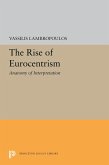Wolin's riveting narrative reveals that Maoism's allure among France's best and brightest actually had little to do with a real understanding of Chinese politics. Instead, it paradoxically served as a vehicle for an emancipatory transformation of French society. French student leftists took up the trope of "cultural revolution," applying it to their criticisms of everyday life. Wolin examines how Maoism captured the imaginations of France's leading cultural figures, influencing Sartre's "perfect Maoist moment"; Foucault's conception of power; Sollers's chic, leftist intellectual journal Tel Quel; as well as Kristeva's book on Chinese women--which included a vigorous defense of foot-binding.
Recounting the cultural and political odyssey of French students and intellectuals in the 1960s, The Wind from the East illustrates how the Maoist phenomenon unexpectedly sparked a democratic political sea change in France.
Dieser Download kann aus rechtlichen Gründen nur mit Rechnungsadresse in A, B, BG, CY, CZ, D, DK, EW, E, FIN, F, GR, HR, H, IRL, I, LT, L, LR, M, NL, PL, P, R, S, SLO, SK ausgeliefert werden.









